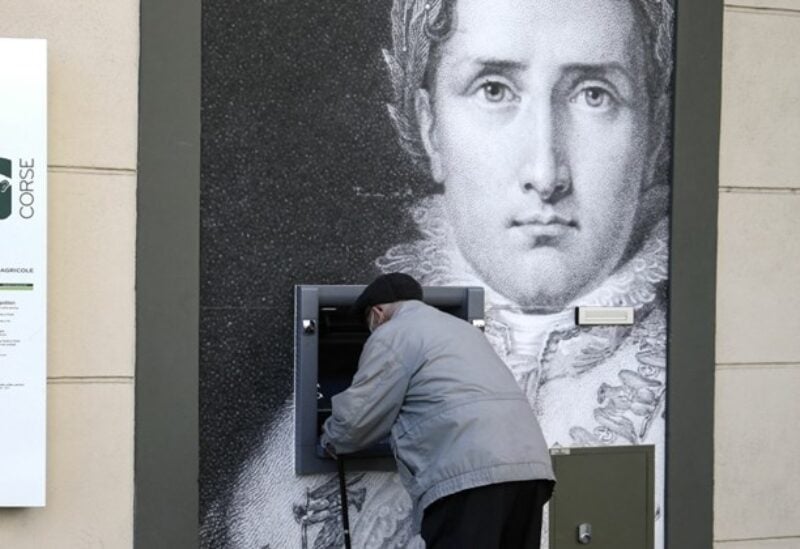
A man uses the cashpoint of a bank adorned with a reproduction of the imperial portrait of Napoleon Bonaparte
PARIS: In the Grand Hall de la Villette on the outskirts of Paris, the trappings of an emperor are gathered: Magnificent outfits, weapons, medals, porcelains, a monumental wedding carriage …
The question, as the 200th anniversary of Napoleon Bonaparte’s death approaches on May 5, is when anyone will get to see them.
The English are once again involved in scuppering his celebrations, after “la variante anglaise” of Covid-19 triggered a fresh wave of the pandemic and sent France back into lockdown.
A multitude of exhibitions, featuring everything from his private boudoir at the Chateau de Fontainebleau to the Army Museum’s gathering of Christ-like portraits that proliferated after his exile, were put on hold.
While the government hopes to reopen cultural sites in mid-May, epidemiologists say that may be premature. It’s not just Covid creating awkward timing for the bicentennial, however.
The increasing focus on France’s racial policies and colonial past have put new emphasis on Napoleon’s legacy, not least his decision to reinstate slavery in 1802, less than a decade after it was abolished under the revolution.
Organisers tackled this head-on, with the biggest exhibition, the 5 million-euro “grand spectacle” at La Villette, due to display the 1802 orders (re-discovered in 2007) for the first time. For historian Catherine Coquery-Vidrovitch, who has written a book on the slave trade, they reflect Napoleon’s heartless pragmatism, rather than outright racism, as he sought to dominate the Caribbean and its sugar trade.
“He gave into the pressures of colonial plantation owners in the Assembly,” she told AFP. “The fate of the slaves themselves no doubt bothered him very little.”
Ex-prime minister Jean-Marc Ayrault, head of the Foundation for the Abolition of Slavery, agrees.
“Napoleon acted as he did in all things: without emotion or morals,” he told AFP. “Napoleon was a cynic.”
Lest this debate sound like “cancel culture” trying to inflict a 21st-century Waterloo on Napoleon, it’s worth noting that he has always divided opinion.
While it is hard to open Google Maps anywhere in France without seeing the names of Victor Hugo, Louis Pasteur or Charles De Gaulle running down a main drag, there are but a handful of side streets dedicated to L’Empereur.
For many, he was a war-monger who left millions dead across Europe, and a despot who turned the ideals of the revolution into a vehicle for his personal ambitions, ultimately leaving France bankrupt and occupied.
Yet, the near-incomprehensible scale of his achievements cannot be ignored: Conquering Egypt and taking control of France by 30, emperor in charge of most of continental Europe by 40.
Even his failures were the stuff of legend: The hubris that led him to disaster in Russia; the astonishing escape from exile in the island of Elba and 22-day march to Paris to retake his throne; a final defeat at Waterloo and sad, last days on St Helena.
Asked to name the greatest general on Earth, his English rival the Duke of Wellington said, “In this age, in past ages, in any age, Napoleon.”
“Part of French society has always been impressed by the glory,” Peter Hicks, of the Napoleon Foundation, told AFP. “That was the currency of the Napoleonic Empire, la grandeur. He was grandeur writ large.”
France’s ambivalence about Napoleon is often overstated, Hicks added. It suited later French regimes to run him down.
It has not stopped some 160 institutions, from schools to museums, signing up for the foundation’s “Annee Napoleon 2021” label.
“They are the state and they aren’t fighting shy of celebrating him,” Hicks said.
All this makes for rich debate, of course.
While the exhibitions may be closed, TV schedules are saturated with new documentaries, and a forest-worth of new books cover everything from Napoleon’s relationship to God, favourite gardens, bouts of depression and love letters to Josephine.
Napoleon also holds mythical status internationally, with the foundation receiving more than a million visitors to its website every year from around the world.
In a fabulous town house in central Paris, collector Bruno Ledoux shows off hundreds of treasures he has fought to keep in France, and out of the hands of buyers in the US, China and Russia, including a military camp bed and one of his five thrones, resplendent in red and gold.
He was the archetype for the modern, self-made man, said Ledoux. “Napoleon represents social mobility, that’s why he is valued everywhere.”
Not quite everywhere.
France’s own leaders have often despised Napoleon. Then-president Jacques Chirac pointedly refused to attend the 200th anniversary of the Battle of Austerlitz in 2005, while ex-prime minister Lionel Jospin celebrated that of his exile by publishing a book titled “The Napoleonic Evil.”
Current president Emmanuel Macron, known for his “en meme temps” (“at the same time”) approach to thorny questions, has typically indicated he will take a nuanced approach. Facing election next year, it is a delicate balancing act. Macron’s office says he will address “this major figure in our history… with open eyes.”
With the pandemic still sucking up political attention, it is unclear what this will mean.